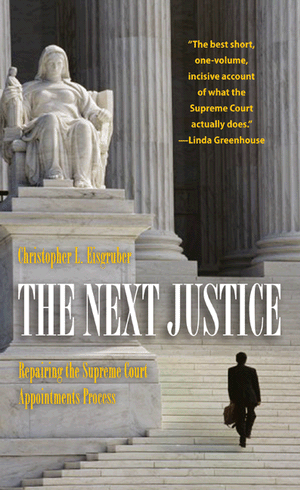 Two of America’s leading sexist bigots, Rush Limbaugh and Newt Gingrich, recently cited a 2001 speech delivered by federal Appeals Court Judge Sonia Sotomayor as proof of her racism. As a liberal partisan, my instinctive reaction is disgust at their cynical attempt to exploit white identity grievance politics against the first Hispanic Supreme Court nominee. Conservatives have been singing the same tune since Richard Nixon’s “law and order” campaign in 1968 with enormous destructive impact upon American civic life.
Two of America’s leading sexist bigots, Rush Limbaugh and Newt Gingrich, recently cited a 2001 speech delivered by federal Appeals Court Judge Sonia Sotomayor as proof of her racism. As a liberal partisan, my instinctive reaction is disgust at their cynical attempt to exploit white identity grievance politics against the first Hispanic Supreme Court nominee. Conservatives have been singing the same tune since Richard Nixon’s “law and order” campaign in 1968 with enormous destructive impact upon American civic life.Nonetheless, Sotomayor’s words and conservative critics reaction to her nomination, is instructive about our race/gender biases as well as the false ideal of objectivity in a Supreme Court justice. By now, many of us have read the following passage from Sotomayor’s 2001 speech to the University of California, Berkeley, School of Law:
“Whether born from experience or inherent physiological or cultural differences, a possibility I abhor less or discount less than my colleague Judge Cedarbaum, our gender and national origins may and will make a difference in our judging. Justice O'Connor has often been cited as saying that a wise old man and wise old woman will reach the same conclusion in deciding cases. I am not so sure Justice O'Connor is the author of that line since Professor Resnik attributes that line to Supreme Court Justice Coyle. I am also not so sure that I agree with the statement. First, as Professor Martha Minnow has noted, there can never be a universal definition of wise. Second, I would hope that a wise Latina woman with the richness of her experiences would more often than not reach a better conclusion than a white male who hasn't lived that life.”First, let’s address the argument between Sotomayor and those who believe that competent judges should reach the same conclusions regardless of their backgrounds, while Sotomayor acknowledges the impact of life experience upon her decisions. It happens there is truth in both arguments.
For example, it might surprise many Americans to learn that the Supreme Court with judges as ideologically different as Antonin Scalia and Ruth Bader Ginsburg could ever reach a unanimous decision. Yet, it’s not unprecedented for the Supreme Court to announce numerous unanimous decisions early in its term. Indeed, on January 27th of this year, the Supreme Court announced five unanimous decisions with respect to civil rights laws protecting workers against employer retaliation. The rights of workers and employers are often wedges between liberals and conservatives, yet Scalia and Ginsburg voted the same way on five such cases earlier this year.
However, Sotomayor is also correct. As legal scholar and former Supreme Court clerk Christopher Eisgruber, persuasively argues, the Constitution contains too many abstract and vague references such as the Equal Opportunity Clause, for nine individuals to interpret the law without any ideological predisposition. Typically, as Eisgruber pointed out to me in a podcast interview two weeks ago, precedent and text regardless of their judicial philosophies restrain lower court jurists. Even the famous case involving fire fighters in New Haven, Connecticut that have conservative critics frothing at the mouth against Sotomayor was a ruling largely based upon precedent and two of her colleagues voted the same way.
Yet as Eisgruber also noted in our interview, historically, liberals and conservative jurists alike are eventually compelled to be “activists” and intervene through judicial review whenever a clause in the Constitution is simply too vague to provide sufficient guidance. As someone who clerked for conservative U.S. Court of Appeals Judge Patrick E. Higginbortham and liberal Supreme Court justice, John Paul Stevens, Eisgruber knows whereof he speaks.
Most of the time, an appeals court judge can be an “umpire” as Chief Justice John Roberts famously put it during his 2005 confirmation hearings. Much of the time, Supreme Court justices are impartial actors and personalities as different as Ginsburg and Scalia often rule the same way. Sotomayor’s background suggests that when the law and Constitution are clear, she will likely be representative of that tradition.
Nonetheless, history also suggests that the next Supreme Court justice will be confronted with cases during their tenure that transcend the text drafted by America’s founders two centuries ago or feel compelled to overturn the will of congress. For example, future Supreme Courts may preside over cases with respect to civil liberties and the technology of functional magnetic resonance imaging (brain mapping) in which neither the Constitution nor legal precedent are applicable. It also seems inevitable the Supreme Court will eventually preside over a case that transcends the will of state legislatures or congress with respect to gay marriage to ensure equal protection for all citizens.
And that leads to the Sotomayor phrase about "a wise Latina woman” that has some conservatives behaving as if their sphincter muscles are on fire. I largely agree with Sotomayor’s 2001 speech. Even so, I believe her words about “a wise Latina woman” were ill chosen. Nonetheless, this latest conservative “outrage” is a mere distraction taken out of context. Conservatives are longtime practitioners of America’s fear industrial complex and the Sotomayor nomination is merely the latest example.
When it’s one of their presidents they want justices with a reliable predisposition towards conservative activism. If a Democrat is in the White House conservatives emphasize restrained moderation. In fairness, liberal activists also emphasize moderation whenever confronted with nominees such as Roberts and Alito but gear up for a fight to advance our cause when we have a Democratic president. Such is the game of politics and elections do have consequences.
Race/gender absolutely influences our worldview and can’t help but have an impact on a Supreme Court justice. Denying that is disingenuous and we shouldn’t. Nor should we fear it. Rather, a diversity of perspectives on our nation's highest court represents America at its best. Presently, this is an uncomfortable reality for many conservatives who don’t want to relinquish the benefits of “white privilege” and feel insecure about a black Democratic president nominating a female Hispanic judge. Unless of course that justice is pliable to their worldview as Clarence Thomas has been.
It happens that I have a measure of empathy for their discomfort. My formative years were in Rockland County, New York and it was largely white bread cookie cutter suburbia when I was a kid. Although I live in Brooklyn, New York, today, I occasionally feel nostalgic about that provincial homogenous existence of my youth. I love the diversity of my adult neighborhood but even a liberal like myself is not above such sentiments.
Nonetheless, white male hegemony domination of the Supreme Court is an anachronism best discarded. Sotomayor's nomination to the Supreme Court is a reflection of our society's maturation and represents progress. As for conservatives and their childish grievances, I say spare the rod and spoil the child.




